SUMMARY
This is AI generated summarization, which may have errors. For context, always refer to the full article.
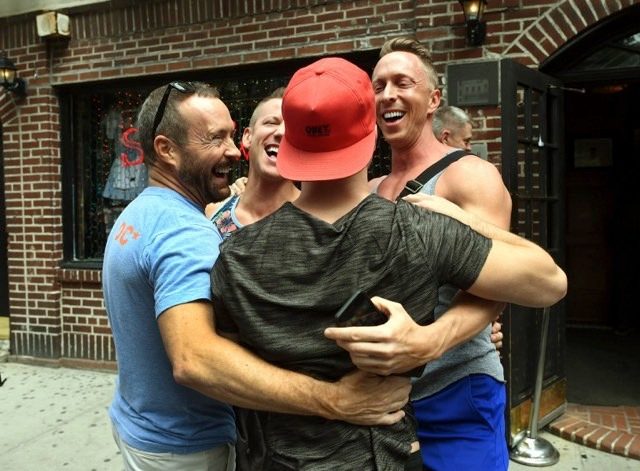
MANILA, Philippines – Many Lesbian, Gay, Bisexual and Transgender (LGBT) Americans have been waiting for this day. In a landmark victory for the LGBT community, the High Court handed down a decision in the case of Obergfell vs Ohio, which effectively legalized gay marriage throughout the entire US.
The Supreme Court voted 5-4 in favor of same-sex marriage legalization. Justices Ruth Bader Ginsburg, Stephen Breyer, Sonia Montemayor, Elena Kagan, and Anthony Kennedy voted in favor of Obergfell.
Though same-sex marriage had already been legalized in 37 states and Washington DC, those who live in states – mostly in the midwest – where it had not been legalized could not compel their home states to recognize their marriages. The Court’s opinion, delivered by US Supreme Court Justice Anthony Kennedy, succinctly articulates why the law could no longer block what the justices call “a fundamental right.”
Here are 12 of the best quotes and excerpts from the 103-page ruling:
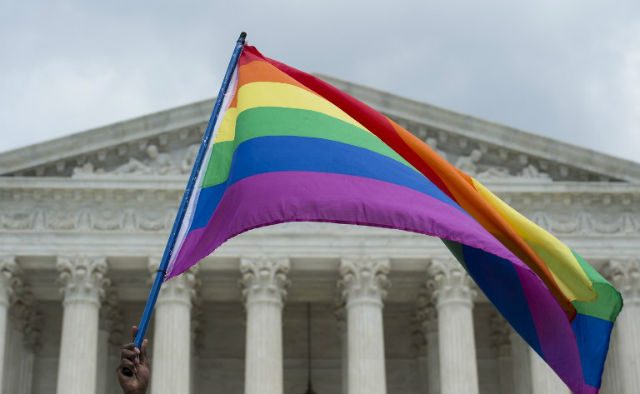
The Constitution promises liberty to all within its reach, a liberty that includes certain specific rights that allow persons, within a lawful realm, to define and express their identity.
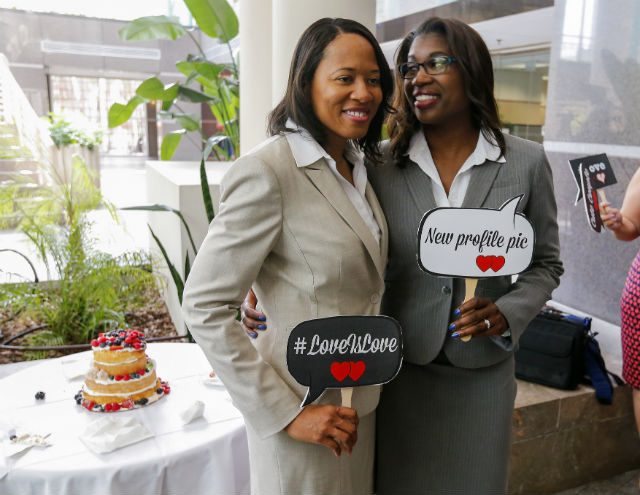
Its dynamic (marriage’s) allows two people to find a life that could not be found alone, for a marriage becomes greater than just the two persons. Rising from the most basic human needs, marriage is essential to our most profound hopes and aspirations.
The centrality of marriage to the human condition makes it unsurprising that the institution has existed for millennia and across civilizations. Since the dawn of history, marriage has transformed strangers into relatives, binding families and societies together.
The court opinion examined the history of marriage and why its definition should evolve
The ancient origins of marriage confirm its centrality, but it has not stood in isolation from developments in law and society. The history of marriage is one of both continuity and change. That institution – even as confined to opposite-sex relations – has evolved over time.
The nature of marriage is that, through its enduring bond, two persons together can find other freedoms, such as expression, intimacy, and spirituality. This is true for all persons, whatever their sexual orientation. There is dignity in the bond between two men or two women who seek to marry and in their autonomy to make such profound choices.
The limitation of marriage to opposite-sex couples may long have seemed natural and just, but its inconsistency with the central meaning of the fundamental right to marry is now manifest. With that knowledge must come from the marriage right impose stigma and injury of the kind prohibited by our basic charter.
If rights were defined by who exercised them in the past, then received practices could serve as their own continued justification and new groups could not invoke rights once denied.
Many who deem same-sex marriage to be wrong reach that conclusion based on decent and honorable religious or philosophical premises, and neither they nor their beliefs are disparaged here.
But when that sincere, personal opposition becomes enacted law and public policy, the necessary consequence is to put the imprimatur of the State itself on an exclusion that soon demeans or stigmatizes those whose own liberty is then denied.
The imposition of this disability (of marriage) on gays and lesbians serves to disrespect and subordinate them. And the Equal Protection Clause, like the Due Process Clause, prohibits this unjustified infringement of the fundamental right to marry. These considerations lead to the conclusion that the right to marry is a fundamental right inherent in the liberty of the person, and under the Due Process and Equal Protection Clauses of the Fourteenth Amendment couples of the same-sex may not be deprived of that right and that liberty. The Court now holds that same-sex couples may exercise the fundamental right to marry. No longer may this liberty be denied to them.
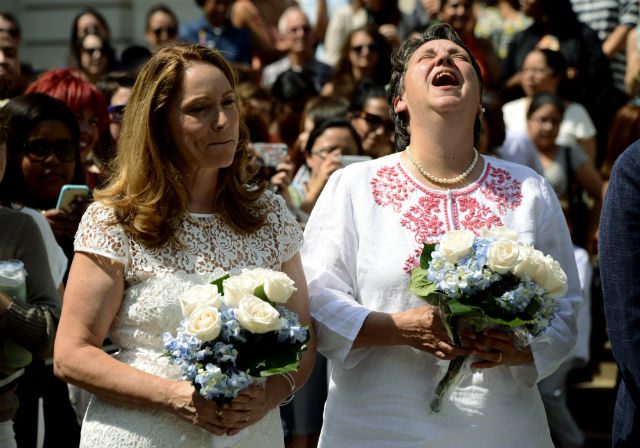
The high court said that they are ruling marriage between people of the same sex is gauranteed under the Equal Protection clauses in the US consitution
As counsel for the respondents acknowledged at argument, if States are required by the Constitution to issue marriage licenses to same-sex couples, the justifications for refusing to recognize those marriages performed elsewhere are undermined. The Court, in this decision, holds same-sex couples may exercise the fundamental right to marry in all States. It follows that the Court also must hold—and it now does hold—that there is no lawful basis for a State to refuse to recognize a lawful same-sex marriage performed in another State on the ground of its same-sex character.
The closing paragraphs of the Court’s opinion say it all.
No union is more profound than marriage, for it embodies the highest ideals of love, fidelity, devotion, sacrifice, and family. In forming a marital union, two people become something greater than once they were.
As some of the petitioners in these cases demonstrate, marriage embodies a love that may endure even past death. It would misunderstand these men and women to say they disrespect the idea of marriage. Their plea is that they do respect it, respect it so deeply that they seek to find its fulfillment for themselves. Their hope is not to be con- demned to live in loneliness, excluded from one of civiliza- tion’s oldest institutions. They ask for equal dignity in the eyes of the law. The Constitution grants them that right.
– Rappler.com
Add a comment
How does this make you feel?

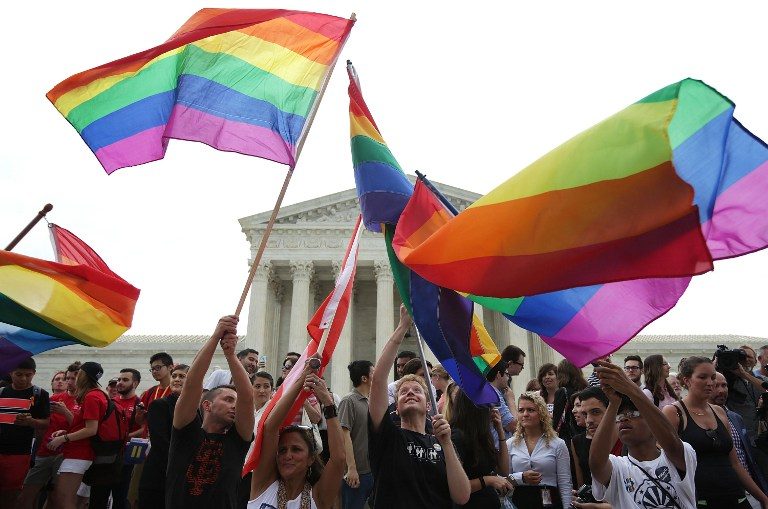
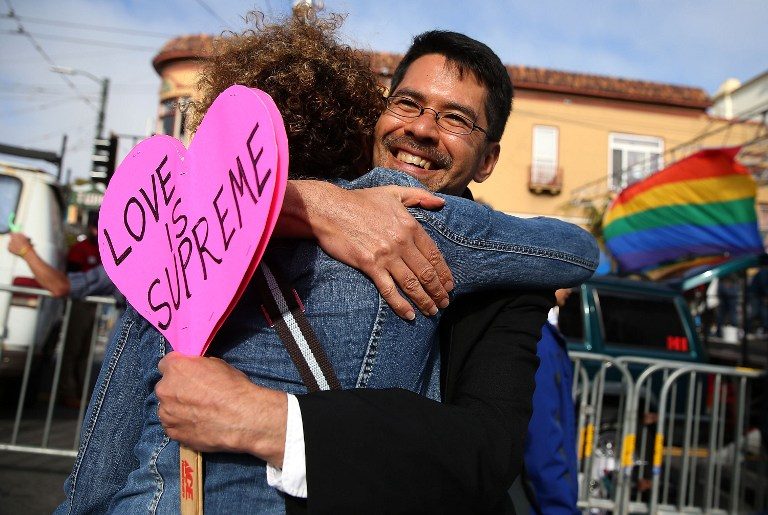
There are no comments yet. Add your comment to start the conversation.